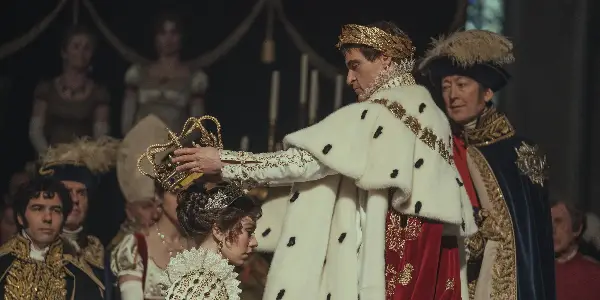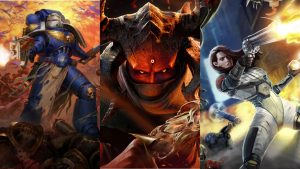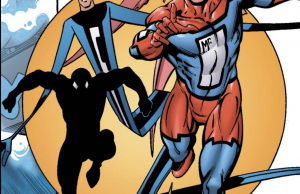
It’s easy to think that when you pair Ridley Scott with a historical figure like Napoleon Bonaparte that you would get a historical epic about how much of a military genius and influential world leader he was. Little did we expect that Scott was going to steer away from something romantic like Gladiator and stay closer to something savage and corny like The Last Duel and House of Gucci. It shouldn’t come as a surprise, I suppose, given that those are indeed the two recent films he’s made. Perhaps Napoleon came off as a throwback to old epics, or maybe that’s just what audiences were hoping for. Needless to say, the result is a mixed, admirable bag.
Mixing Grand Epic Action with Head Scratching Drama
By casting an actor like Joaquin Phoenix in the lead role, Scott reveals his intentions early on in Napoleon, to portray a man whose only talent is in military strategy. When the film focuses on the large-scale battles, there’s a grim seriousness that thunders across the screen. From the sound design to the cinematography to the bombastic choreography of soldiers and horses and cannon fire, the action in Napoleon is terrific. It feels like we’re in safe hands, which of course we are. We’re watching a veteran filmmaker do what he has been comfortable doing for decades now.
Where the film struggles to find its footing is in the talking scenes. They often feel like they belong in a completely different movie from the action sequences. Whether it’s the dialogue or the creative choices in the performances, you can never pinpoint whether the film is going for serious drama or campy satire.
source: Columbia Pictures, Apple Original Films
For Phoenix, he navigates comfortably through this muddled territory, given his history of playing corrupt leaders in power (Gladiator) and broken pathetic men (The Master, Beau Is Afraid). But time and time again, it is unclear on a writing level just how much of the tonal shifts are intentional. After the 1794 execution of the Jacobin leader Robespierre, we meet Joséphine (Vanessa Kirby), revealed to be one of the 41,500 prisoners released at the end of the Reign of Terror. The chemistry between Napoleon and Joséphine is non-existent. They don’t exactly flirt properly, and much of their power dynamic (whether on a political level or… a possible BDSM level?) is unspecified. My gut tells me that is because half of these talking scenes have been hacked to death in the cutting room, with some left to dry on the floor. Scenes between the two of them go from one clear dramatic takeaway to another, with little sense of proper transition. Even with Phoenix and Kirby being reliably great, there’s something missing in the story between these two real figures, one that I hope Scott’s 4-hour cut will fix.
Carefully Choosing the Lens to View History
Regardless of the tonal inconsistencies and the hacked pacing, the one component of Napoleon I have to praise is Scott’s insistence on how we should view this historical figure. Again, it could be so easy for a movie to glorify and romanticize an authoritarian dictator. How does a film properly depict the great things a man has done in history, while still acknowledging that they were terrible?
This is important because if viewed from a 10,000 feet point of view, the Napoleonic Wars can easily be interpreted as a showcase of how undefeated and brilliant he was. After all, this is a man who had to be exiled twice because he came back the first time. It took a grand total of seven European coalitions to finally defeat Napoleon, and their winning strategy was… to avoid fighting Napoleon. Though the film does include worldly leaders like Tsar Alexander I of Russia and Arthur Wellesley, Duke of Wellington, the script’s decision to not follow them and see events from their points of view can hinder the audience’s understanding of Napoleon’s dominant chokehold on Europe. That being said, keeping the entire film focused solely on Napoleon’s perspective gains another benefit, that we get to see how big worldly consequences can come from the smallest pettiest decisions made by the French Emperor.
source: Columbia Pictures, Apple Original Films
But perhaps the biggest, most obvious closer to the film’s intention is the way it presents its end text, where the film explains some of Napoleon’s greatest battles through a cynical, contemptuous point of view. It’s the perfect way to end the film, so much so that I wish the rest of the film contained a bit more of that anger.
Napoleon: A Flawed Epic of Genres and Warnings
One can understandably argue that Napoleon can’t make up its mind on what to be. Is it a portrayal of a toxic dictator who couldn’t be stopped because he was a skilled military leader? Is it about a beloved emperor who can’t stand the idea that he is actually a cuck? Or is it about a sad loser who is desperate and cruel enough to do anything to be taken seriously from the world?
Scott clearly wants to do all of the above, and the truth of the matter is that all of those ideas are interesting, despite not meshing perfectly together. Once again, it is a problem that could potentially be solved if the movie is long enough. But for now, Napoleon feels a lot like its titular character: loudly ambitious to a fault.
Napoleon premiered in Paris on November 14, 2023. It will be released in theaters in the United States on November 22, 2023 and then on Apple TV+ at a later date.
Does content like this matter to you?
Become a Member and support film journalism. Unlock access to all of Film Inquiry`s great articles. Join a community of like-minded readers who are passionate about cinema – get access to our private members Network, give back to independent filmmakers, and more.








